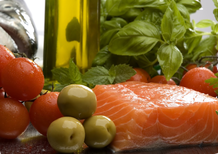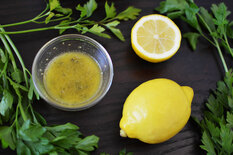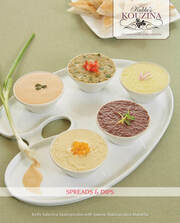Greek up your kouzina lifestyle!

Greece, especially Karpathos (the island where we’re from), is surrounded by water, so fish is plentiful, making it the country’s main source of protein. Greeks eat more lower-fat plant proteins (such as nuts, seeds, and legumes) and fewer high-fat meats. Whole foods are the norm and processed foods are frowned upon. Daily meals include whole grains, healthy fats (like omega-3s), and fresh vegetables and fruits are in abundance. And lets not forget the red wine!
This blog is a companion to part 1 of our Mediterranean Diet Resolution blog featuring recipes that will get you on your way to a healthy and happy new you!
my big fat Greek pantry
Lemon
Though this isn’t a spice or herb, it’s necessary to mention because just about everything in Greek cooking has lemon in it and it adds iconic flavor. Bottom line, lemons are to Greek cuisine like curry is to Indian food. You’ll find lemon mostly combined with the other Greek essentials of olive oil, oregano, and garlic. Together, these four flavors can turn ordinary food into a Greek dish—poultry, fish, lamb, tomato salad, artichokes, avgolemono soup, sauces, and so much more—and the result will make you a hero in your own kitchen. Our favorite uses include ladolemono (olive-oil and lemon dressing, λαδολέμονο, pronounced lah-thoh-LEH-moh-noh): Toss with cooked broccoli or spinach; combine with oregano and garlic to marinate lamb and roast with potatoes; combine with parsley to dress grilled/broiled fish. Growing up, our mom gave us cold lemon juice for nausea and warm juice for diarrhea. It worked every time and we’re never without lemons in our fridges! So when life hands you lemons, be Greek about it!

½ cup extra-virgin olive oil
¼ teaspoon grated lemon zest (optional)
¼ cup freshly squeezed lemon juice
2 tablespoons to ¼ cup chopped fresh flat-leaf parsley (for fish dishes)
In a large bowl, whisk together the olive oil, zest (if using), and lemon juice until emulsified. For fish dishes, stir in the parsley (to taste) just before serving. Use about 2 tablespoons dressing per serving, tossing to combine with vegetables. Pour over fish just before serving. Store dressing (without parsley) in an airtight container in the refrigerator up to 2 weeks.
No matter how you slice, chop, crush or mash it, ya gotta have garlic when it comes to making skordalia (garlic dip, σκορδαλιά pronounced skor-thah-LIAH), slow-roasted lamb, lentil soup, and a ton of other dishes. In Greek cooking, its usual companion is lemon juice or vinegar, which balances out the flavor of each dish perfectly. Eating garlic also helps to ward off a cold and lower cholesterol.

3 to 5 cloves unpeeled garlic (to taste)
1 cup plus 1 tablespoon extra-virgin olive oil, divided
½ cup freshly squeezed lemon juice
1 teaspoon mustard
2 tablespoons chopped fresh thyme
2 teaspoons fine sea salt
½ teaspoon freshly ground pepper
1. Heat the oven to 400°F. Place garlic cloves on a cookie sheet and toss with 1 tablespoon olive oil to coat. Roast for 15 to 20 minutes, until fragrant and golden brown (do not burn). Let stand until cool enough to handle, then peel and mash. Set aside.
2. In a large bowl, whisk together the mashed garlic, lemon juice, mustard, thyme, salt, and pepper until combined well. While whisking, slowly pour in the remaining 1 cup olive oil, whisking until emulsified. Store dressing in an airtight container in the refrigerator up to 2 weeks.
Recipes by Kelly Salonica Staikopoulos
Copyright © 2019 Kukla's Kouzina: A Gourmet Journey~Greek Island Style
Refer to our Mediterranean Diet Resolution blog for our plan and suggestions, introducing a healthy Greek lifestyle for your New Year.
Sign up for our e-newsletter (if you haven’t already) and stay connected on social media for cooking tips and recipes, as well as for all Kukla's Kouzina updates and news.
Thanks for following us and we’ll see you next Monday.
Until then~
Kali orexi! Good appetite!
Kelly
Web design by Kelly Salonica Staikopoulos








